Page 33 of 67
Practice parameter for the assessment and treatment of psychiatric disorders in children and adolescents with intellectual disability (intellectual developmental disorder)
Siegel, MatthewBellonci, Christopher et al. Journal of the American Academy of Child & Adolescent Psychiatry, December 2019 This practice parameter from the American Academy of Child and Adolescent Psychiatry is a useful resource for mental health professionals assessing and treating with children who have intellectual disabilities. https://www.jaacap.org/article/S0890-8567(19)32223-3/fulltext?dgcid=raven_jbs_aip_email
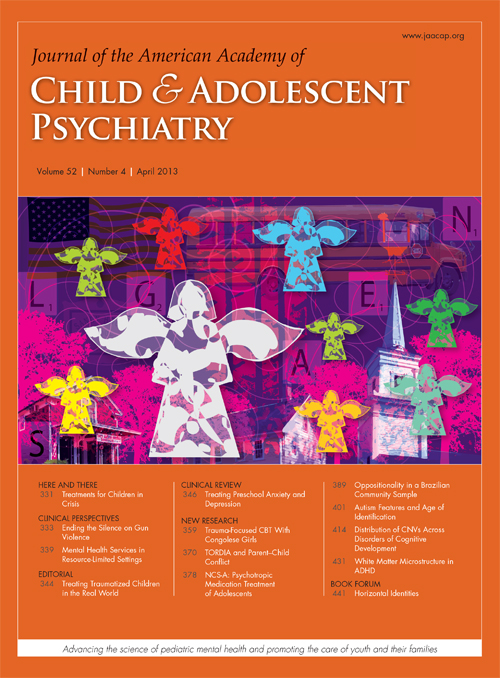
December 18, 2019
Maternal depression and infant attachment security: A meta‐analysis
Barnes, J, Theule, J. Infant Ment Health J. 2019; 40: 817– 834. https://doi.org/10.1002/imhj.21812 This systematic review found that infants of mothers with depression were nearly twice as likely to have a non-secure attachment than were infants of healthy mothers. https://onlinelibrary.wiley.com/doi/abs/10.1002/imhj.21812?campaign=woletoc

Adolescent mental health following exposure to positive and harsh parenting in childhood
Kingsbury, M., Sucha, E., Manion, I., Gilman, S. E., & Colman, I. (2019). The Canadian Journal of Psychiatry. https://doi.org/10.1177/0706743719889551 Debate has long existed between positive and harsh parenting techniques. The results of this Canadian study suggest that the better option may depend on the age and sex of a child. Harsh parenting was particularly detrimental […]
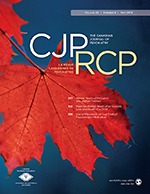
A randomised controlled trial of treatments of childhood anxiety disorder in the context of maternal anxiety disorder: clinical and cost‐effectiveness outcomes
Creswell, C., Violato, M., Cruddace, S., Gerry, S., Murray, L., Shafran, R., Stein, A., Willetts, L., McIntosh, E. and Cooper, P.J. (2020). J Child Psychol Psychiatr, 61: 62-76. doi:10.1111/jcpp.13089 Many clinicians wonder if addressing child anxiety without addressing co-existent parent anxiety is enough. This study demonstrates that additional CBT-based treatment of maternal anxiety does not […]
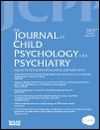
Reduction in mental health treatment utilization among transgender individuals after Gender-affirming surgeries: A total population study
Bränström R1, Pachankis JE1. Am J Psychiatry. 2019 Oct 4: appiajp201919010080. doi: 10.1176/appi.ajp.2019.19010080 This study of over 2500 individuals on the Swedish Total Population registry found that although six times more likely to have mental health problems including anxiety and depression than the general population, transgender individuals were less likely to require treatment for these […]
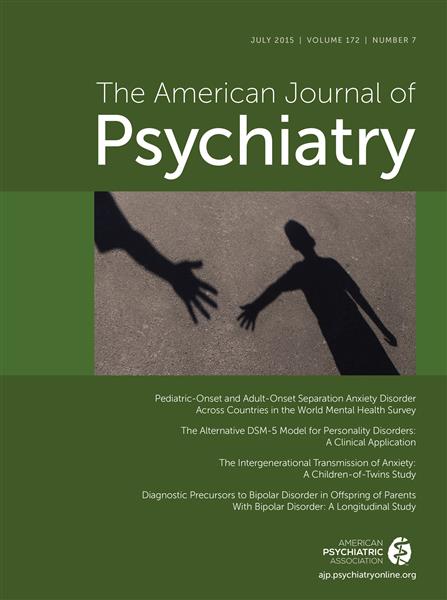
October 22, 2019
Association between electronic cigarette use and marijuana use among adolescents and young adults: A systematic review and meta-analysis
Chadi N, Schroeder R, Jensen JW, Levy S. JAMA Pediatr. Published online October 01, 2019173(10):e192574. doi:10.1001/jamapediatrics.2019.2574 Despite evidence that e-cigarettes can help smokers quit, this systematic review finds that adolescents aged 12-17 who use e-cigarettes are 3.5 times more likely to use marijuana, suggesting that e-cigarettes may provide a ‘gateway’ to further substance use. https://jamanetwork.com/journals/jamapediatrics/article-abstract/2748383?guestAccessKey=7cf121ff-0711-4cbb-9f2f-9ecc2500bdb9&utm_source=silverchair&utm_medium=email&utm_campaign=article_alert-jamapediatrics&utm_content=etoc&utm_term=100819
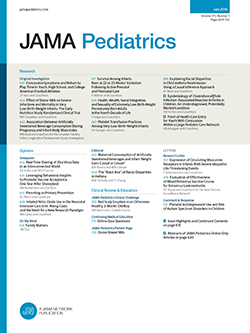
Male callers to an Australian perinatal depression and anxiety help line—Understanding issues and concerns
Fletcher, R, StGeorge, J, Newman, L, Wroe, J. Infant Ment Health J 2020; 1– 11. https://doi.org/10.1002/21829 This study found that most Australian males who used a Perinatal Anxiety and Depression Australia (PANDA) national helpline did so to discuss concerns about maternal mental health, the relationship with their partner and their own mental health. https://onlinelibrary.wiley.com/doi/abs/10.1002/imhj.21829?campaign=wolearlyview

Association of positive family relationships with mental health trajectories from adolescence to midlife
Chen P, Harris KM. JAMA Pediatr. Published online October 07, 2019. doi:10.1001/jamapediatrics.2019.3336 This longitudinal study of over 18,000 individuals foudnd that those who experienced positive adolescent family relationships had significantly lower levels of depressive symptoms from early adolescence to midlife than did those who experienced less positive family relationships. https://jamanetwork.com/journals/jamapediatrics/article-abstract/2752557?guestAccessKey=66a69eb9-87ac-48d2-8a43-725882ddffac&utm_source=silverchair&utm_medium=email&utm_campaign=article_alert-jamapediatrics&utm_content=olf&utm_term=100719

Association of use of oral contraceptives with depressive symptoms among adolescents and young women
de Wit AE, Booij SH, Giltay EJ, Joffe H, Schoevers RA, Oldehinkel AJ. JAMA Psychiatry. Published online October 02, 2019. doi:10.1001/jamapsychiatry.2019.2838 This study of over a thousand females found that oral contraceptive use was assiocated with increased depressive symptoms, particularly crying, hypersomnia and eating problems, at 16 years of age. https://jamanetwork.com/journals/jamapsychiatry/article-abstract/2751923?guestAccessKey=684b8317-1135-4423-a59c-177252f05a69&utm_source=silverchair&utm_medium=email&utm_campaign=article_alert-jamapsychiatry&utm_content=olf&utm_term=100219
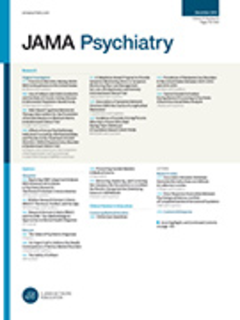
Association between screen media use and academic performance among children and adolescents: A systematic review and meta-analysis
Adelantado-Renau M, Moliner-Urdiales D, Cavero-Redondo I, Beltran-Valls MR, Martínez-Vizcaíno V, Álvarez-Bueno C. JAMA Pediatr. Published online September 23, 2019. doi:10.1001/jamapediatrics.2019.3176 This systematic review of 58 studies found that television viewing and video game playing, but not overall screen media, were inversely associated with the academic performance of children and adolescents. This association was greater for […]

Page 33 of 67
Got an event to promote? Submit your event here

